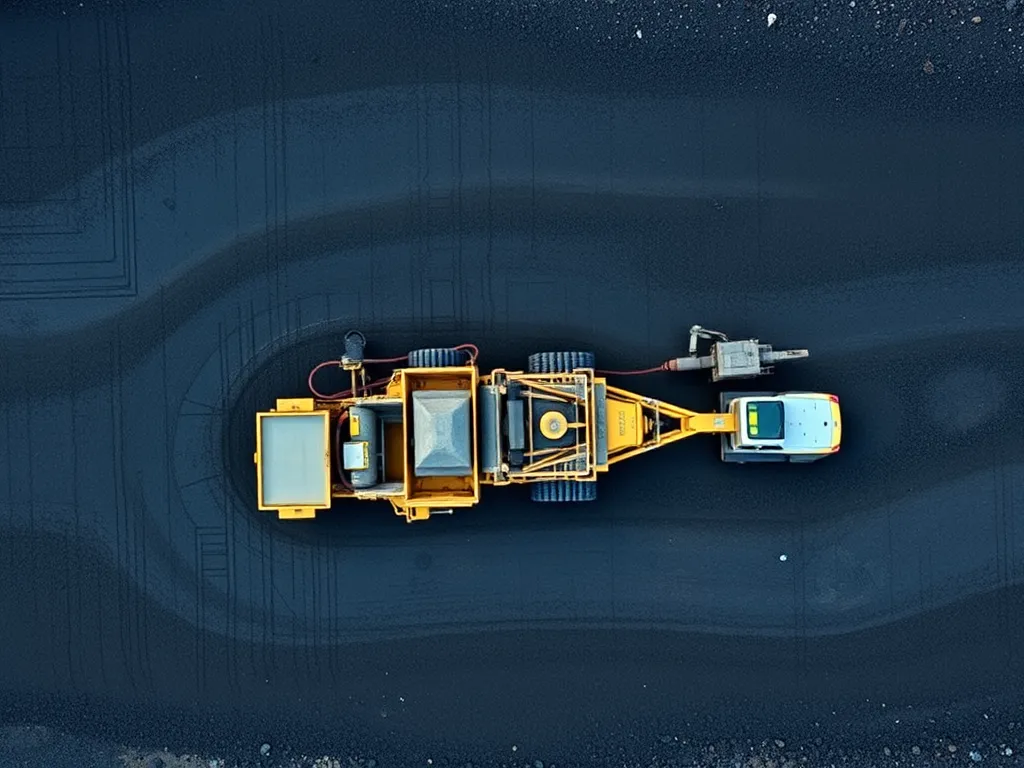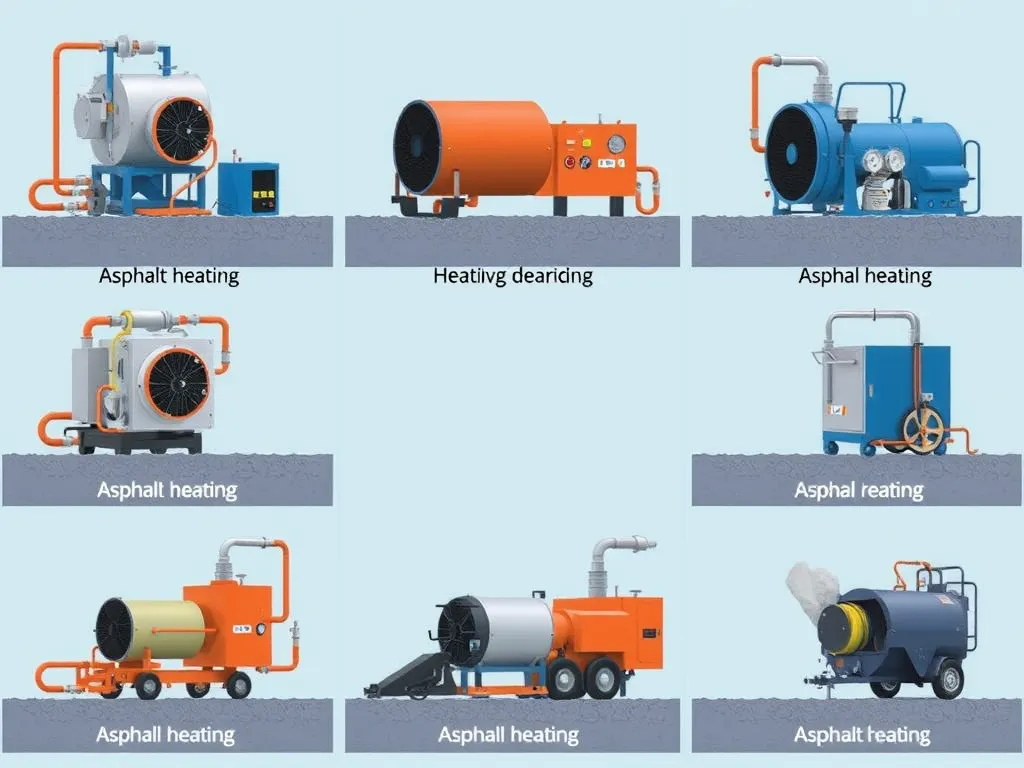Asphalt Vs Concrete Driveways: Which Saves You More Money?
Published on: November 3, 2025 | Last Updated: April 14, 2025
Written By: George Voss
Asphalt driveways cost $2.50-$4.00 per square foot installed, while concrete runs $4-$8 per square foot – but material price tells only half the story. Asphalt offers lower upfront costs and faster installation (1-2 days versus 4-7 days for concrete), while concrete provides longer lifespan (30-40 years vs asphalt’s 15-20 years) and lower maintenance needs. Homeowners must weigh immediate budgets against long-term costs: asphalt requires sealcoating every 3-5 years ($0.15-$0.25 per sq ft), while concrete may need crack repairs ($500-$1,000+) or resurfacing ($3-$10 per sq ft) over decades.
This analysis breaks down driveway costs from initial quotes to replacement cycles. We’ll compare installation methods, climate impacts (freeze-thaw resistance vs crack risks), and hidden expenses like drainage prep or decorative finishes. Real-world pricing examples show how a 600 sq ft driveway could cost $1,500-$2,400 for asphalt versus $2,400-$4,800 for basic concrete. Later sections detail maintenance schedules, repair costs, and how material choices affect home resale values. Bring your measurements – we provide calculation tools to estimate both options for your specific project.
Contents
- Initial Cost Comparison: Asphalt Vs Concrete Driveways
- Long-term Financial Considerations
- Asphalt Driveway Cost Advantages
- Concrete Driveway Cost Considerations
- Installation Process Cost Factors
- Durability & Climate Performance
- Maintenance Cost Analysis
- Calculating Driveway Costs
- Property Value Impact
- Environmental Considerations
- Frequently Asked Questions
- Closing Thoughts
- Additional Resources for You:
Initial Cost Comparison: Asphalt Vs Concrete Driveways
Upfront pricing gaps show up starkly at installation. Asphalt typically wins on day-one savings, but material quality and local labor rates sway final numbers.
Average Price Ranges for Asphalt Driveways
Hot mix asphalt (HMA) costs shift with crude oil pricing and aggregate availability. Standard installations run 25% to 60% below concrete options.
Cost of Asphalt Driveway per Square Foot
$3 to $7 per sq.ft. covers materials, grading, and compaction. A 600 sq.ft. drive with 2-3″ thickness might total $1,800 to $4,200. Base prep adds $1 to $3 per sq.ft. if subsoil needs stabilization.
Average Price Ranges for Concrete Driveways
Portland cement mixtures command higher pricing but offer design flexibility. Plain gray slabs start at double asphalt’s base rate before adding finishes.
Concrete Driveway Cost per Square Foot
$6 to $15 per sq.ft. forms the typical span. A 4″ thick 600 sq.ft. drive ranges from $3,600 to $9,000. Stamped patterns or color hardeners push rates to $18+ per sq.ft. High PSI (3000-4000) mixes add 10-15% to material costs.
Material choice forms just part of the story – ongoing upkeep and climate impacts tilt budgets in coming years.
Long-term Financial Considerations
Evaluating lifetime expenses requires looking beyond initial quotes. Material durability, climate effects, and upkeep demands shape total ownership costs over decades.
Asphalt Driveway Lifespan &Amp; Maintenance Costs
Properly installed asphalt driveways typically serve 15-20 years. Sealcoating every 3-5 years protects against oxidation and water damage, costing $0.15-$0.25 per square foot. Without regular sealing, UV rays degrade the bitumen binder, leading to cracks needing $1.50-$3.00 per linear foot for repairs. Winter freeze-thaw cycles cause fewer issues due to asphalt’s flexibility, though snowplow blades may gouge surfaces needing patching at $100-$400 per occurrence.
Concrete Driveway Lifespan &Amp; Repair Expenses
Concrete driveways last 30-40 years but face higher repair bills. Cracks from ground shifts or salt exposure run $3-$6 per square foot to fix. Spalling (surface flaking) in freeze zones requires $4-$8 per square foot for grinding and resurfacing. Stained or discolored slabs often need $2-$4 per square foot for acid washing or tinted overlays. While less frequent than asphalt maintenance, concrete interventions prove more disruptive and costly.
While long-term expenses vary, upfront installation methods further shape overall budgeting decisions.
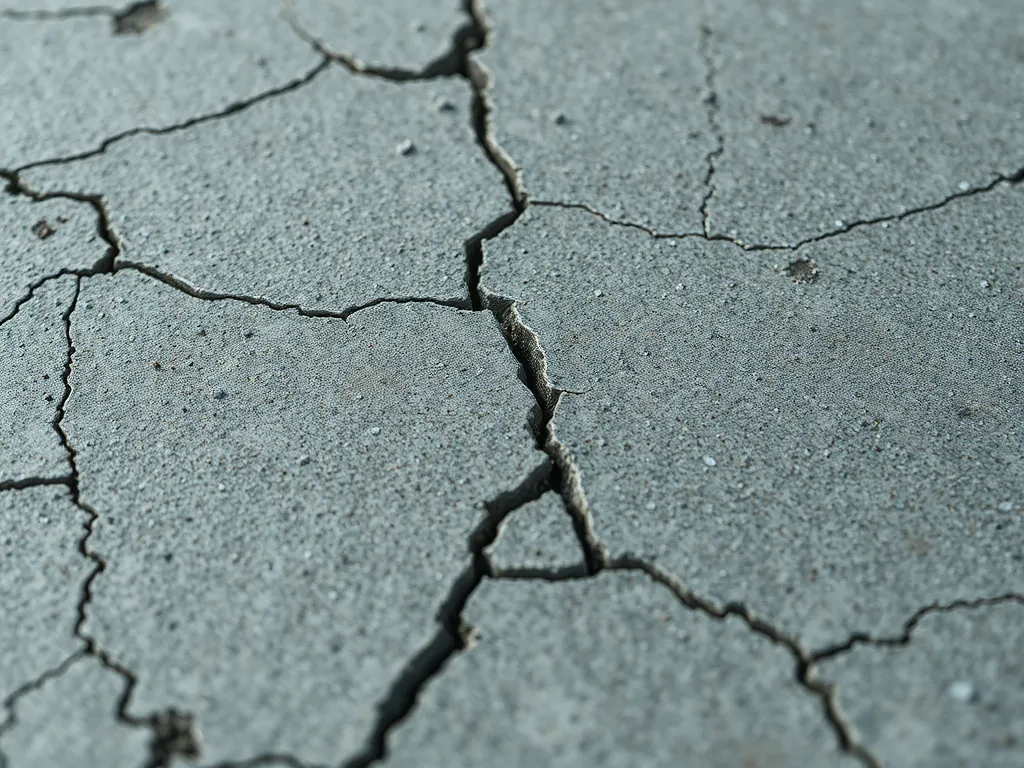
Asphalt Driveway Cost Advantages
Asphalt often beats concrete in key cost areas. Let’s break down three core savings points for your budget.
Lower Upfront Installation Costs
Asphalt driveways cost $3-$7 per sq ft to pour. Concrete runs $6-$15 per sq ft. A 1,000 sq ft asphalt drive costs $3,000-$7,000. The same size in concrete hits $6,000-$15,000. Lower material prices and simpler install methods keep asphalt costs down. Hot mix asphalt (HMA) uses 95% stone/sand and 5% binder, cutting raw material bills.
Faster Installation Process
Asphalt crews lay 2-3 inches of hot mix in hours. The drive sets in 24-48 hours. Concrete needs 4-6 inches of pour, forms, and 7-day curing. Faster install cuts labor fees. Crews charge $45-$75/hour for asphalt vs $50-$100/hour for concrete. Cold weather? Asphalt can’t be poured below 50°F, but concrete delays add costs if temps drop during curing.
Cost-effective Repairs
Fixing asphalt costs $2-$5 per sq ft. Seal small cracks for $0.10-$0.50 per linear foot. Pothole patches run $50-$200 each. Concrete crack repairs start at $8-$15 per sq ft. Full slab replacements hit $8-$12 per sq ft. Asphalt’s flexibility helps it shift without breaking. Sealcoating every 3-5 years ($0.15-$0.25 per sq ft) adds years to its 15-20 year life.
While asphalt saves cash upfront and long-term, concrete offers design perks that some pay extra for. Let’s see how style choices affect price tags…
Also See: Eco-friendly Asphalt Additives: Sustainable Solutions
Concrete Driveway Cost Considerations
Concrete driveways need more cash up front than asphalt. But they last longer if kept right. Let’s break down why costs add up.
Higher Initial Investment
Pouring concrete costs $6-$15 per square foot. Asphalt runs $3-$7. Why the gap? Concrete needs forms, steel bars, and skilled crews. Mixes with fiber or air bubbles push prices higher. Cold joints and cure time (7 days) stretch labor hours. Budget 30-50% more than asphalt for the same size.
Decorative Options &Amp; Associated Costs
Concrete lets you pick looks. Basic stamps run $8-$18 per square foot. Fancy patterns hit $30. Colors add $2-$6 per bag to the mix. Exposed stones cost $10-$15 extra. But these perks fade. Sealing every 2-3 years costs $0.15-$0.25 per square foot. Asphalt can’t match these styles but stays cheaper to maintain.
Now see how install steps shape costs for both materials.
Installation Process Cost Factors
Material prices tell only part of the story. Labor and preparation demands significantly impact total costs for both asphalt and concrete driveways.
Site Preparation Requirements for Asphalt
Asphalt installation needs a stable base to prevent cracks. Contractors typically excavate 6-8 inches of soil, grade the area, and compact a crushed stone subbase. Clay-heavy soils may require deeper excavation – adding $1.50-$3 per square foot to base prep costs. Existing pavement removal adds $2-$5 per square foot. Proper drainage systems (French drains or slope adjustments) tack on $1,000-$3,000 for larger properties.
Concrete Curing Time Impact on Labor Costs
Concrete demands 7-28 days to reach full strength, requiring crews to monitor sites and delay follow-up work. This extended timeline increases labor expenses by 15-25% compared to asphalt projects. Pouring in cold weather (<50°F) extends curing to 10+ days, potentially doubling labor hours. Asphalt cools to traffic-ready status in 24-48 hours, allowing faster project completion. Crews typically charge $45-$75 hourly for concrete curing supervision.
While installation costs set the stage, material performance in different weather conditions plays an equally vital role in long-term expenses.
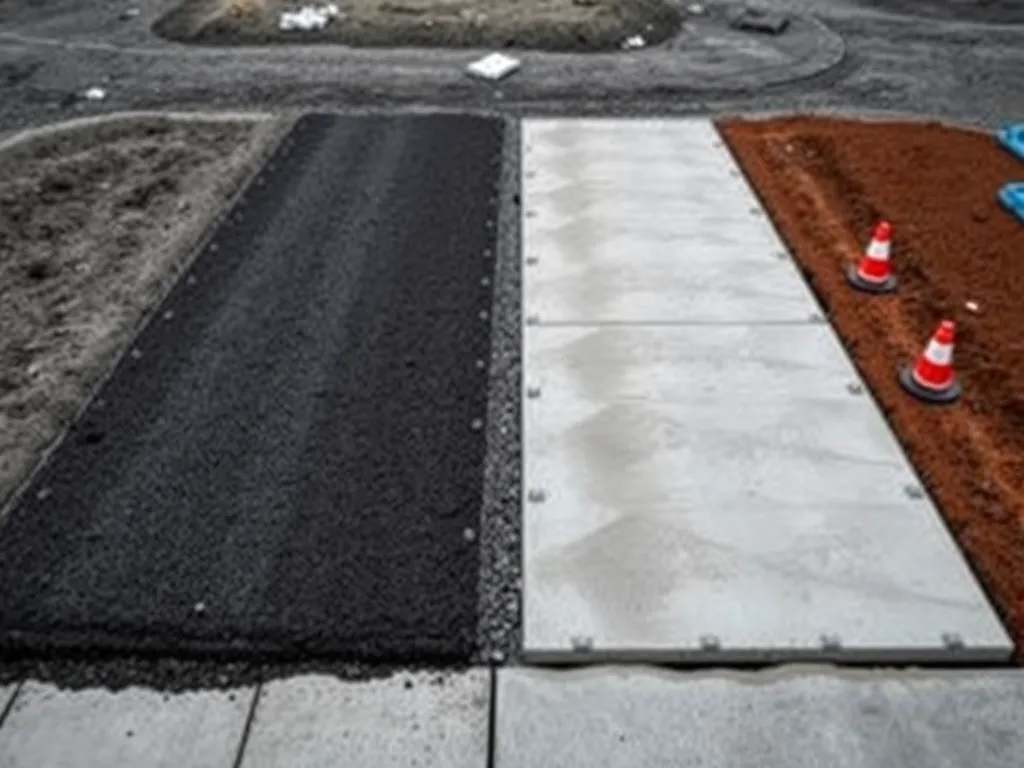
Durability & Climate Performance
Weather impacts driveway costs through repair needs and lifespan. Material choice affects long-term budgets in cold regions.
Asphalt Performance in Freeze-thaw Cycles
Asphalt bends better in cold weather. Its mix contains performance-graded (PG) binders that resist cracking when temps swing from 20°F to 50°F. This flexibility cuts repair costs by 30-40% versus rigid surfaces. A well-built asphalt drive lasts 15-20 years with proper care. Seal every 3-5 years at $0.15-$0.25 per sq ft to block water damage.
Concrete Crack Risks in Cold Climates
Concrete cracks when soil freezes and shifts under slabs. Repairing splits costs $3-$5 per sq ft. Control joints help but add $1-$2 per sq ft during install. Salt used for ice melt speeds surface wear (spalling), needing $4-$8 per sq ft fixes. Northern states see 50% more concrete drive repairs than warmer zones.
Climate challenges shape upkeep costs over time. Next, see how annual care budgets compare.
Maintenance Cost Analysis
Ongoing upkeep plays a critical role in total driveway ownership costs. Both materials demand distinct maintenance strategies with varying price tags over time.
Asphalt Sealing Frequency &Amp; Costs
Asphalt driveways require sealcoating every 3-5 years to prevent oxidation and water damage. Professional sealing costs $0.15-$0.25 per square foot, while DIY kits run $70-$120 for 500 sq.ft. coverage. Northern states with harsh winters often need more frequent applications – sometimes biannually after year 10.
- Standard resealing: $250-$500 (1,000 sq.ft driveway)
- Crack filling add-on: $0.50-$2 per linear foot
- Fuel surcharges: 10-15% extra in remote areas
Concrete Resurfacing Expenses
Concrete driveways typically need resurfacing every 10-15 years at $3-$10 per square foot. Decorative options like stamped overlays spike costs to $8-$15/sq.ft. Major repairs for spalling or heaving concrete often hit $6-$12/sq.ft – comparable to full replacement in some cases.
- Basic resurfacing (1,000 sq.ft): $3,000-$10,000
- Color staining: +$2-$5/sq.ft
- Joint resealing (annual): $0.30-$0.80/linear foot
These maintenance patterns directly impact the asphalt vs concrete driveway cost equation over 20+ years. Next, we’ll break down measurement methods for precise project budgeting.
Calculating Driveway Costs
Accurating pricing for surfacing jobs starts with math. Both asphalt and concreto follow distinct formulas factoring material quantity, labor, and local pricing. Getting this right stops budget surprises.
Price to Pour Asphalt Driveway: Formula &Amp; Examples
Asphalt costs run $100-$150 per ton. Installation math: (Length x Width x 0.167) ÷ 27 x Asphalt Price + 30% labor. A 20×20’ job? 20×20=400 sq ft. 400 x 0.167=66.8 cubic ft. 66.8 ÷27=2.47 tons. At $120/ton: 2.47x$120=$296. Add 30% ($89): $385 total. This puts asphalt driveway cost per square foot at $1.93-$2.25.
Concrete Driveway Pricing: Measurement Guide
Concreto runs $4-$8 per sq ft. Multiply length x width for total area. A 24×24’ slab? 576 sq ft x $6.50 avg = $3,840. Add 2.5% for cutting waste. Upgrades like stamping (+$8-$12/sq ft) or coloring (+$2-$4/sq ft) spike costs. PSI ratings matter too: 3000-4000 PSI mixes suit most homes.
With both materials’ pricing frameworks clear, it’s smart to think about how surfacing costs sway your home’s worth long-term.
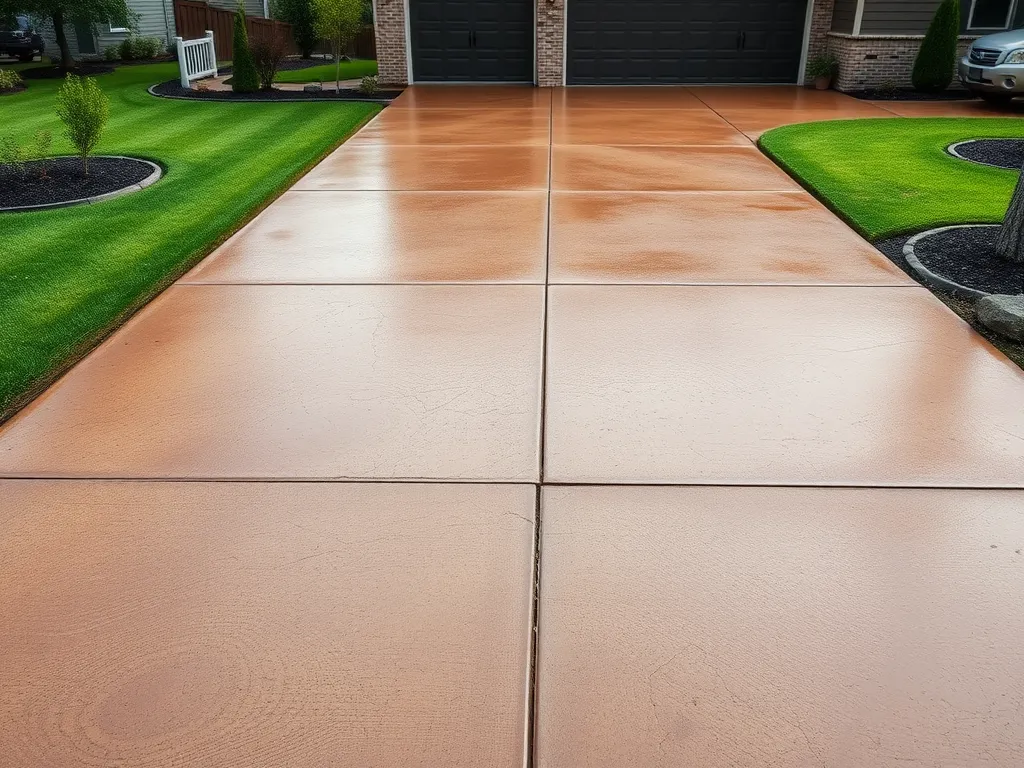
Property Value Impact
Driveway material choices affect home resale potential and tax assessments. Homeowners weighing asphalt vs concrete driveway price must analyze long-term financial impacts beyond initial installation.
Resale Value Comparison: Asphalt Vs Concrete
Concrete driveways typically add 5-7% more resale value than asphalt. A 2023 National Association of Realtors study shows poured concrete driveways yield 75% return on investment versus 50% for asphalt. This gap narrows in colder climates where asphalt’s freeze-thaw performance (rated for -30°F to 120°F) appeals to buyers. Stamped concrete designs with exposed aggregate ($12-$18/sq ft) can boost curb appeal further.
Property Tax Implications
Higher appraisals from premium driveway materials may increase annual property taxes. A $15,000 concrete driveway costing 50% more than asphalt ($10,000) could raise home value by $5,000. At a 1.5% tax rate, this adds $75/year. Asphalt’s lower profile keeps assessments stable – critical for budget-conscious owners. Always check local appraisal rules: 22 states exempt driveway replacements under $20,000 from reassessment.
While upfront costs dominate discussions, smart buyers also weigh these hidden financial levers. Next, we’ll examine how material choices align with eco-conscious trends affecting modern home values.
Environmental Considerations
Material choices impact both ecological footprints and long-term budgets. Let’s break down how asphalt and concrete stack up in sustainability.
Asphalt Recycling &Amp; Sustainability
Asphalt leads in circular economy practices. Over 99% of asphalt pavement gets recycled in the U.S., with reclaimed material (RAP) reused in new mixes. Contractors blend 20-30% RAP into fresh asphalt driveways, cutting material costs by $3-$7 per ton. This process slashes landfill fees and reduces virgin aggregate mining. Homeowners save 10-15% on replacement projects using recycled asphalt.
Concrete Production Carbon Footprint
Concrete manufacturing emits 0.93 pounds of CO₂ per pound of cement – 8% of global emissions. Producing a standard 600 sq.ft. concrete driveway releases 4,800 lbs of CO₂ versus 1,200 lbs for asphalt. Rising carbon taxes could add $0.50-$1.50 per sq.ft. to concrete driveway costs by 2030. Some states now mandate low-carbon concrete mixes, increasing prices 12-18% compared to traditional pours.
These ecological factors directly influence long-term costs and regulatory impacts, setting the stage for common homeowner questions.
Frequently Asked Questions
Is It Cheaper to Install Asphalt or Concrete Driveways?
Asphalt driveways generally have lower upfront installation costs compared to concrete. While asphalt ranges from $3 to $7 per square foot, concrete can cost between $6 and $15 per square foot. Therefore, if immediate budget constraints are a concern, asphalt is typically the more economical option.
What is the Cost Of a 20×20 Asphalt Driveway?
The cost for a 20×20 asphalt driveway can vary based on local materials and labor rates, but on average, it will be around $1,200 to $2,800, factoring in installation costs.
How Does Concrete Perform Vs Asphalt in Cold Climates?
Concrete tends to crack more easily in cold climates due to its rigidity, especially when exposed to freeze-thaw cycles. In contrast, asphalt’s flexibility allows it to withstand temperature variations better, potentially resulting in lower repair costs in those environments.
What Are the Hidden Costs Of Asphalt Driveways?
Hidden costs of asphalt driveways may include sealcoating every 3-5 years, potential pothole repairs, and establishing drainage systems if necessary. Additionally, maintenance costs can rise significantly if the driveway isn’t properly cared for, which can lead to more frequent repairs over time.
How to Calculate Per Square Foot Costs for Both Materials?
To calculate the per square foot cost for asphalt, divide the total cost of installation by the overall area in square feet (for example, the costs of materials and labor divided by the total square footage of the driveway). For concrete, follow the same method, taking into account any additional costs for decorative elements or enhanced PSI ratings, which can also affect the final price per square foot.
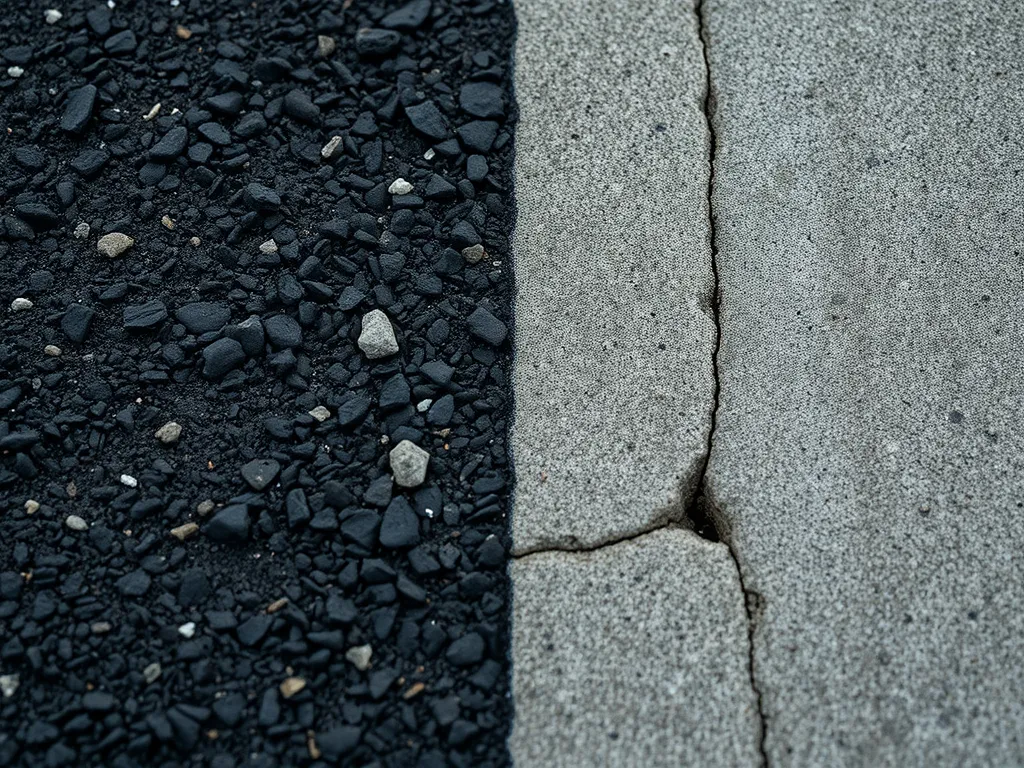
Closing Thoughts
When deciding between asphalt and concrete driveways, cost plays a significant role. Asphalt typically offers lower initial costs and faster installation, making it an attractive option for budget-conscious homeowners. On the other hand, concrete provides durability and aesthetic flexibility, albeit at a higher upfront price.
Both materials have unique long-term implications. Asphalt requires regular sealing and maintenance, while concrete might necessitate resurfacing over time. Understanding these factors can guide you in making an informed choice that fits your financial situation and property needs.
For a detailed cost breakdown and more information on driveway options, visit Asphalt Calculator USA. Making the right investment today can enhance your property value tomorrow.
Additional Resources for You:
- Kett, I. (1999). Asphalt Materials and Mix Design Manual. Oxford: Elsevier Science.
- Asphalt vs Concrete Driveways: A Comparative Analysis – Waste Removal USA
- Asphalt vs. Concrete Driveway: Which Should You Choose? | Angi
- Concrete vs. Asphalt Driveways in Minnesota | idcAutomatic
- Concrete vs. Asphalt Driveway: A Detailed Cost Analysis

